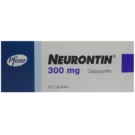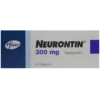What is Neurontin (Gabapentin)?
Neurontin (generic name gabapentin) is one of the best anticonvulsant drugs. Its active use in the treatment of epilepsy helps many people whose lives are complicated by this disease. Neurontin helps control epileptic seizures. It is available in capsules, tablets and liquid forms. Neurontin interacts with calcium channels in the brain, reducing the abnormal electrical activity that causes seizures. It can be used in combination with other antiepileptic drugs or as monotherapy in adults and children. Neurontin is often prescribed for partial and generalized tonic-clonic seizures.
Neurontin is actively used to treat neuropathic pain that is not treatable with conventional painkillers. It is often prescribed off-label to help manage nerve pain associated with shingles, diabetes, spinal cord injury, fibromyalgia and more.
When to Use Neurontin?
Neurontin is primarily used to help control partial onset seizures in epilepsy patients. It is approved as adjunctive therapy for adults and children when added to other anti-epileptic drugs. Neurontin should be taken on a regular basis, not only when seizures occur, for maximum benefit.
It may also be prescribed off-label by doctors to treat neuropathic pain that has not responded well to regular analgesics. Neurontin can help relieve nerve pain associated with postherpetic neuralgia, diabetic neuropathy, fibromyalgia, spinal injuries, and more. It offers a relatively mild side effect profile compared to some other pain medications.
For chronic pain conditions, Neurontin is often prescribed when first-line options like NSAIDs, opioids, and tricyclic antidepressants have failed to provide sufficient pain relief. It is considered an alternative option before trying medications like pregabalin or duloxetine.
Neurontin is usually well tolerated, making it a versatile option for both add-on epilepsy therapy and for managing difficult-to-treat neuropathic pain. Patients should take it exactly as directed by their healthcare provider.
What is the Proper Dosage?
For treating epilepsy, the typical Neurontin starting dosage for adults is 300 mg three times per day which can be increased up to 1200 mg three times daily. Pediatric dosing starts at 10-15 mg/kg/day in divided doses. The maintenance dose is adjusted based on seizure control and tolerability.
When used for neuropathic pain, the starting Neurontin dosage is usually 100-300 mg per day taken in divided doses, which is then gradually increased based on pain relief and side effects. The maximum daily dose is 3600 mg daily.
Neurontin can be taken with or without food. The total daily dosage amount is split into three equal doses taken throughout the day. Patients with kidney problems may require dosing adjustments. Always take Neurontin as prescribed by your doctor.
Side Effects
- Drowsiness
- Dizziness
- Unsteadiness
- Nausea
- Vomiting
- Weight gain
- Swelling in extremities
- Dry mouth
Rarely, more serious side effects may occur like depressed mood, irregular heart rate, or intense skin rash. Discontinue Neurontin and seek medical care if any signs of liver injury arise such as dark urine, abdominal pain, or jaundice. Do not drink alcohol while taking Neurontin.
Missed Dose
If a dose is missed, take it as soon as remembered unless it is almost time for the next dose. Do not double up doses. Resume the regular dosing schedule.
Overdose
Seek immediate medical attention for a Neurontin overdose even if symptoms seem minor. Call the poison control helpline at 1-800-222-1222. Overdose can result in extreme drowsiness, confusion, agitation, loss of consciousness, coma, and death without urgent care.



